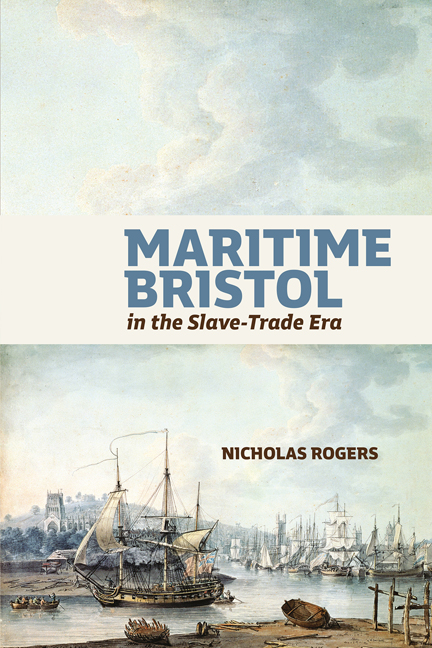Book contents
- Frontmatter
- Dedication
- Contents
- List of Figures
- Acknowledgments
- List of Abbreviations
- Introduction: High Tides, Atlantic Waters
- 1 The Pilots of Pill
- 2 The Hazards of the Bristol Slave Trade
- 3 Slave-ship Sociology
- 4 The Unfortunate Shipwright, or, the Trials of Robert Barker
- 5 Mutiny and Murder on Bristol’s Long-haul Ships, 1720–70
- 6 Bristol Privateering in the Mid-eighteenth Century
- 7 The Impressment of James Caton, 1779
- 8 New York in Bristol: the Crugers
- 9 The Politics of Abolition in Late Eighteenth-century Bristol
- Bibliography
- Index
2 - The Hazards of the Bristol Slave Trade
Published online by Cambridge University Press: 08 May 2024
- Frontmatter
- Dedication
- Contents
- List of Figures
- Acknowledgments
- List of Abbreviations
- Introduction: High Tides, Atlantic Waters
- 1 The Pilots of Pill
- 2 The Hazards of the Bristol Slave Trade
- 3 Slave-ship Sociology
- 4 The Unfortunate Shipwright, or, the Trials of Robert Barker
- 5 Mutiny and Murder on Bristol’s Long-haul Ships, 1720–70
- 6 Bristol Privateering in the Mid-eighteenth Century
- 7 The Impressment of James Caton, 1779
- 8 New York in Bristol: the Crugers
- 9 The Politics of Abolition in Late Eighteenth-century Bristol
- Bibliography
- Index
Summary
What port awaits us, Davy Jones’ or home?
I’ve heard of slavers, drifting, drifting,
playthings of wind and storm and chance,
their crews gone blind,
the jungle hatred crawling up on deck.
Robert Hayden, ‘Middle Passage’‘Everyone that enters upon it’ wrote Henry Laurens of the slave trade, ‘should fortify themselves against misfortune.’ There were many who would concur. William Snelgrave, a London-based slaver of the 1720s, alert to the dangers, zoned in on African mutinies aboard slave ships, which he designated the ‘chief subject’ of his Account. Seventy years later, the abolitionist Thomas Clarkson addressed the same issue in a letter to one of the early leaders of the French Revolution, the Comte de Mirabeau. There was an ever-present threat of rebellion aboard ship, he told this progressive aristocrat, and all too frequently the insurgencies of slaves were ‘industriously consigned to oblivion, that not a Trace, if possible, may be found’. Clarkson cited the case of the Britannia, a Bristol ship skippered by James Bruce, where shackled slaves besieged the ships’ barricade and overran the quarterdeck only to be suppressed by superior firepower. Confronted by defeat, some of the militants ‘cast themselves into the Sea, with masks of Joy in their Countenance, and of the most perfect Contempt for their oppressors.’ Or, so it was reported. Of the 190 slaves who boarded the vessel on the Windward coast, only ninety reached Barbados.
The revolt on board the Britannia was far from exceptional. A seaman who had sailed on three Bristol slave voyages during the 1760s told Thomas Clarkson that the predicament of capture was ‘so very intolerable and grievous’ that Africans ‘will do anything to extricate themselves from it’. Historians who have trawled through the relevant sources for the long eighteenth century have discovered roughly 500 acts of collective violence by Africans caught up in the British, Dutch, and French slave trades: nearly 100 by free Africans who attacked boats and vessels from the shore, often as reprisals against malicious trading; and about 400 shipboard mutinies. These are conservative estimates, for Clarkson was right to note that slaveship captains were reluctant to chronicle many intended revolts because they would reflect badly on their reputations.
- Type
- Chapter
- Information
- Maritime Bristol in the Slave-Trade Era , pp. 34 - 56Publisher: Boydell & BrewerPrint publication year: 2024



